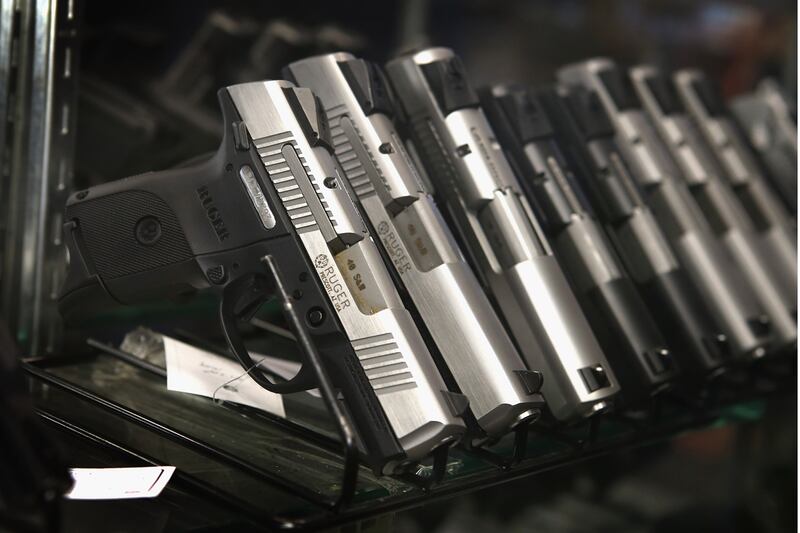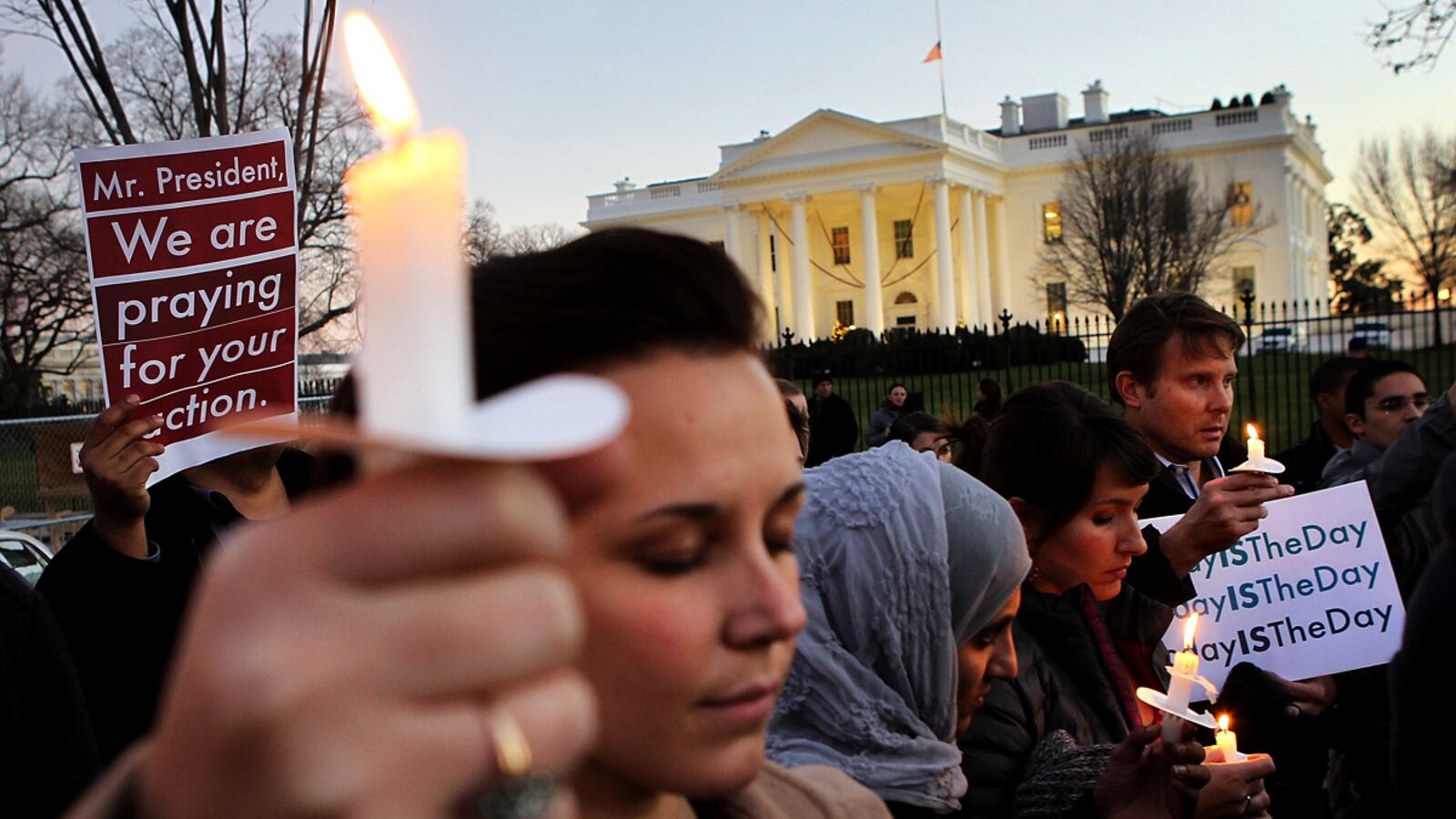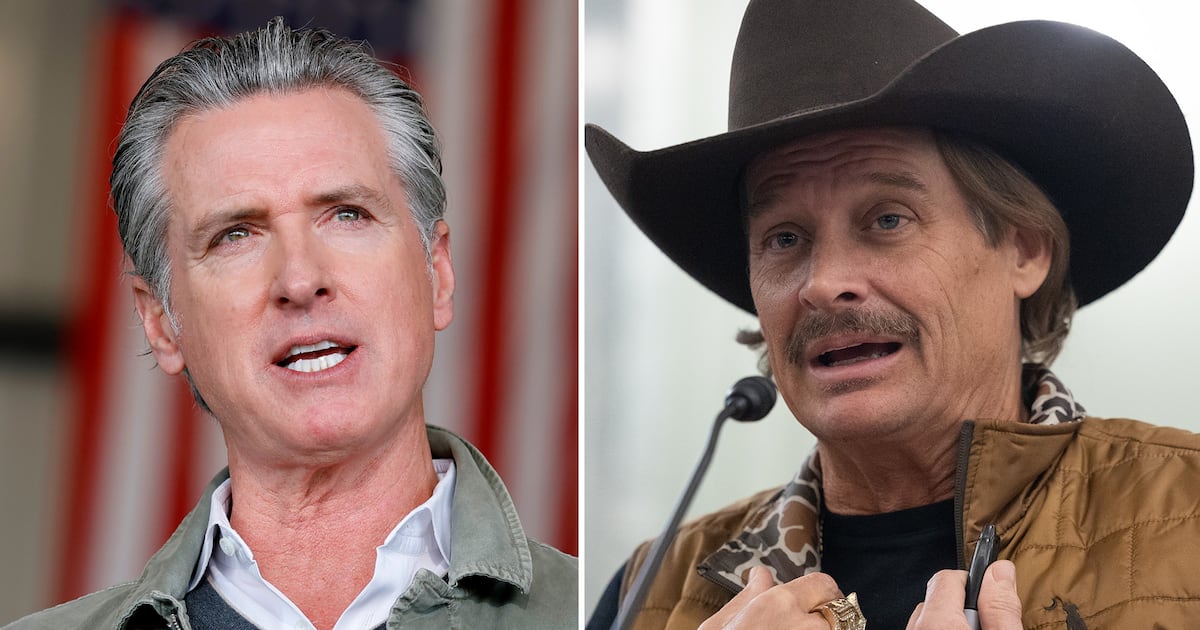Since hideous, unspeakable gun massacres are such a regular occurrence in this country, I’ve had the several opportunities to live the cycle of horror, outrage, argument, recrimination, and inaction that engulfs the Internet each time. It usually goes something like this: I share a couple of links in the heat of the moment, and dissenters—many of them Southern friends and relatives—come out of the woodwork to debate. The responses are as predictable as my anti-gun links: “guns don’t kill, people do”; “if someone had had a gun, maybe they could have stopped this”; “more guns make people safer”; “taking guns away from law-abiding people means only criminals will have guns.”

No matter how I attempt to rebut these empty slogans, they never lose their power. On Friday, the horror of imagining small children gunned down in their classrooms with an assault rifle, the images of their parents screaming in despair, didn’t seem to do one bit to persuade any of the usual suspects that maybe citizens having unlimited access to assault weapons isn’t the best idea. It was sobering: the desperate denial, the contorted excuses. I spent most of the day wondering, if this won’t change people’s minds, will anything?
Having grown up in rural Texas, I shouldn’t be surprised that gun violence has virtually no impact on people’s thinking about weapons there. People live side-by-side with guns every day. Handling guns, either for hunting or pleasure shooting, is a part of the excitement of growing up: you learn to shoot, you learn to always put the safety on, and always stand behind the barrel. You shoot animals and watch them die and it’s no big deal. Guns are so ubiquitous that people don’t even realize the risk they take any time they handle one, or the extreme danger to their children in an environment of such casualness about them. When tragic accidents and horrific crimes happen, people grieve, but never does anyone blame the guns. They should have been locked up better, and so-and-so’s kids should have been taught never to play with them.
I would wager most people in my hometown are unaware that the South is, many times over, more violent than any other part of America. Within a span of a few years in my childhood, a hairdresser at the salon where my parents took me to get haircuts was gunned down at her workplace on the town square, in the middle of the day. A few years later, one of my dad’s coworkers was shot to death on his own property by an assassin hired by his crazy ex-wife. Almost every time I return and pick up the local newspaper, I’m surprised by the violent gun crimes that occur in a relatively well-off town of less than 5,000 people. You would think that such an experience of gun violence would turn people against them, but no, it’s just a fact of life. Most of us from the South are only a generation or two away from people who remember the days of sheriffs and outlaws, when the ability to defend one’s family was a necessity for survival. Those days have passed, but people are still powerfully shaped by the memory of them.
Looking at the conservative response through that lens, you can see the outlines of a worldview, one where people feel that it’s the personal duty of individual citizens to deal with problems, or to save innocent victims from gun violence. It’s as if “government” and “law enforcement” are not even concepts; sure, maybe we have those institutions around for some reason, but what happens in society is fundamentally our responsibility. At its best, this spirit is what outsiders admire about America; at its worst, it can be reflexive, irrational opposition to anything that looks like collective problem-solving. In my experience, Southerners tend to fall on the latter end of the spectrum, and meet tragedies like Newtown with bizarre blanket declarations about the impossibility of doing anything to stop future massacres. People intend their staunch defense of gun rights as an expression of their belief in personal responsibility and self-reliance; in practice, it is a profoundly fatalistic surrender to violence and the imagined requirements of surviving it.
This acceptance of violence is, of course, not limited to the South. Every time a gun massacre dominates the headlines, gun sales spike, indicating a significant number of Americans believe that somehow, owning a gun will protect them. A journalist friend in East Texas told me the day after the Aurora theater shooting in July, her phone rang all day long with people asking how to get concealed-carry permits. I’ve heard it over and over, from friends and relatives, expressing what sometimes seems like the universal response of rural America: The good people need to be armed so they can protect us from the bad people.
This contrasts sharply with the facts of public policy, where the efficacy of more restrictive gun controls is not a matter of debate. The United States’ lax gun laws indisputably, beyond a shadow of a doubt, lead to more gun deaths. The statistics comparing the U.S. to other Western nations with tighter gun laws are staggering: the number of Americans who die in gun accidents in a given year is routinely many times higher than the total gun deaths in the U.K. In Britain in 2008, there were 39 gun murders; in the U.S. in 2009, there were 9,146—that’s right, even adjusted for our larger population, the American rate is 47 times higher. Japan’s recent gun bans have virtually eliminated gun murder in their country. In our country, the states with the strictest gun laws have the lowest rates of gun crime.
But none of this matters when guns serve as a powerful cultural signifier for Americans, in the South and elsewhere, of their self-reliance and independence from government. It makes no difference whether gun bans, as a matter of fact, drastically reduce gun deaths. It makes no difference that it’s extremely unlikely that the presence of an armed person would have stopped any of the massacres that have seized the headlines the past few years. It makes no difference that there is no reason whatsoever for a private citizen to own an assault weapon. The pragmatic logic of public policy is no match for the power of a cultural sensibility that has made guns a deep ideological attachment. A few thousand civilian deaths seem insignificant against the imaginary scenario of totalitarian government “turning on” its disarmed citizens.
If I could appeal directly to the objectors who populate my social media feeds, I would beg them to understand that such a scenario is a fantasy. The idea of a dictatorial American state disarming its citizens is a paranoid delusion. Updating our gun laws does not necessarily mean banning guns, and it almost certainly does not mean confiscating them. There is a reasonable case to be made for the place of concealed-carry permits in a sensible gun policy. Making it more difficult for troubled young men to order assault rifles on the Internet has nothing to do with undermining “personal responsibility” or taking away someone’s cultural identity. The only thing there is to lose is the experience of children being murdered in cold blood, over and over and over again.






